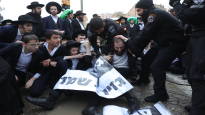Haredi Jews can avoid military service on the basis of religious studies. This angers Israel, where military service applies to all Jewish women and men.
Prime Minister in Israel Benjamin Netanyahu the government is again in danger of falling. The reason this time is a topic that has been raging for years, the military service of Haredi Jews.
In Israel, military service is compulsory for all Jewish men and women. Men serve in the army for about three years, women two.
However, for years the Haredi, who represent ancient Judaism, have managed to avoid military service by appealing to the study of the Jewish holy text, the Torah. The exception particularly annoys secular Israelis, especially in the middle of the Gaza war.
In 2018, Israel’s Supreme Court overturned a law that allowed Haredi Jews to avoid military service. After this, the Haredi have been able, by the government’s decision, to postpone entering the military service by studying in Jewish schools, yeshivas, until the upper age limit for call-ups is filled. It is currently 26 years.
Now Israel’s Supreme Court demands that Netanyahu’s government come up with a bill by April that would increase the share of Haredim in the army. If the coalition cannot reach an agreement on the proposal, the military service law must also be applied to the Haredi population without exceptions.
The finished bill should be passed in the Israeli parliament, the Knesset, by the end of June.
The government is faltering
Netanyahu once again has to walk a tightrope in the preparation of the law. On the other hand, the two haredi parties in the government are against being forced into the army. According to media reports, they threaten to leave the government if the requirements of the new military service law are too strict for the haredi.
On the other hand, two other members of Netanyahu’s three-person war cabinet, Defense Minister Yoav Gallant and opposition leader, former army chief Benny Gantzdemand stricter Haredi recruiting practices.
Gantz has threatened to leave the war cabinet if the show leaves too many loopholes for the military to evade. Gallant says he’ll support the show if Gantz does too.
The fall of the government would be a very bad option for Netanyahu, as his support has suffered based on opinion polls with the hard hitting Gaza war.
Also, a war cabinet shake-up in the middle of a war would hardly boost Netanyahu’s points among voters, who are still waiting for the release of Israeli hostages taken by Hamas from Gaza.
Netanyahu draft law currently includes, according to media reports, a “significant and gradual increase” in the recruitment of soldiers from yeshiva and financial penalties for yeshiva that do not meet the required quotas. In addition, it would require the Israeli army to develop a new battalion of Haredi Jews.
Earlier, raising the upper age limit for conscription to 35 was also on the table, but this aroused strong opposition from both Netanyahu’s government partners and the opposition.
A long dispute
There have long been tensions between Haredi Jews and secular Israelis.
Israel has mobilized almost 300,000 soldiers to fight against the extremist organization Hamas in Gaza and against the extremist organization Hezbollah operating in Lebanon on the country’s northern border. The Haredi exemption is now considered particularly discriminatory towards other population groups in Israel.
The military service of Haredi Jews was also at the center of last year’s large anti-government demonstrations. The government pursued a legal system reform that was considered undemocratic, the background of which was considered to be an effort to write into the law a permanent permit for haredim to leave military service.
The Haredim are the fastest growing population group in Israel due to the high birth rate – the growth rate is about four percent per year. About 13 percent of Israel’s population are Haredi Jews. According to Knesset data, approximately 13,000 Haredi men reach the military service age of 18 each year, but less than ten percent of them register for military service.
In addition to military service exemptions, Haredi Jews have been criticized for their low employment rate. Haredi men’s employment rose in the first half of last year to a record high, and still the figure was only 55.8 percent. A good 73 percent of Haredi women were employed.
One of the controversial political topics is the fact that, for example, Haredi Jewish schools receive significant subsidies from the state.
Sources: Reuters, AP
